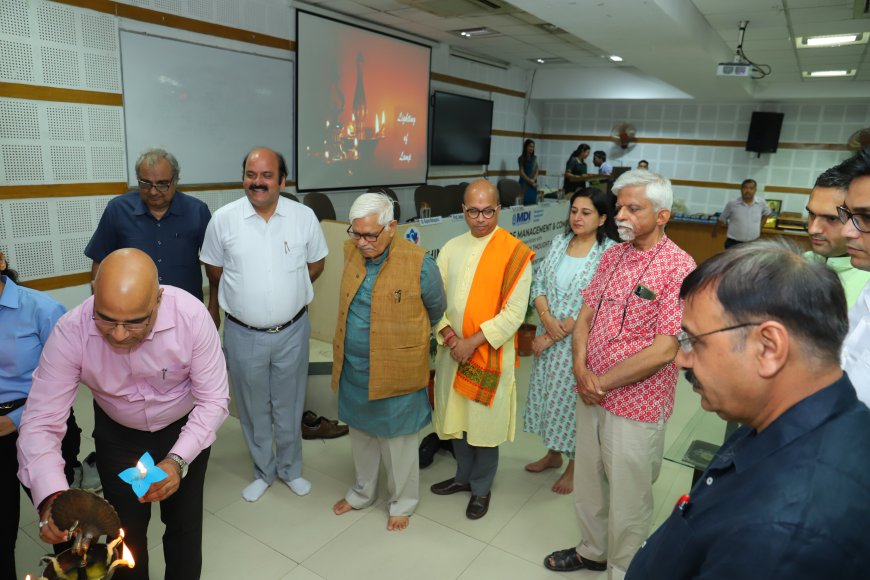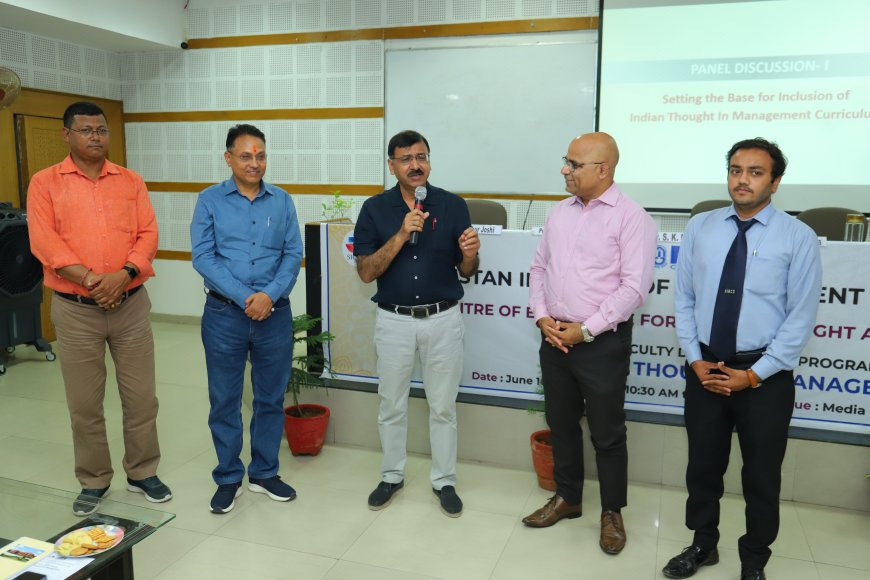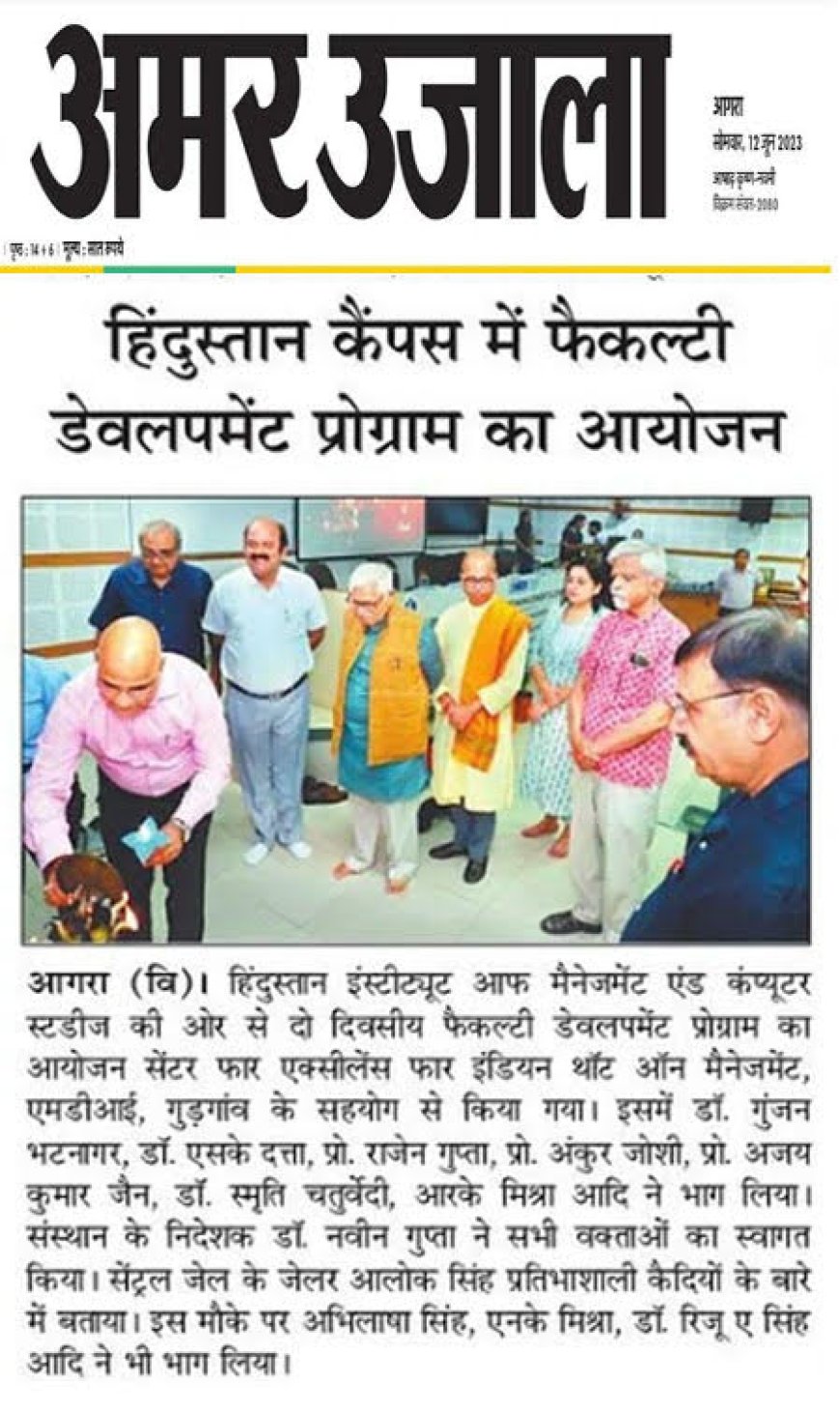FDP on "Indian thought of Management" @ HIMCS
FDP on "Indian thought of Management" @ HIMCS
Hindustan Institute of Management and Computer Studies(HIMCS), in collaboration with the Centre for Indian Thought in Management, MDI, Gurugram, successfully conducted a Faculty Development Program (FDP) on "Indian Thought and Management" on June 10, 2023.
The enriching workshop explored the expansive richness of Indian philosophy and its relevance to contemporary management principles. The program aimed to understand the philosophical foundations of Indian thought, promote its integration into contemporary management practices, and create a platform for dialogue and discussion among educators, researchers, and management professionals. The event witnessed enthusiastic participation from both faculty and students of the Institute.
The program began with traditional prayers and welcome address by Prof. V K Sharma and was followed by a series of insightful sessions led by distinguished speakers - A brief account of the key topics covered are given below
1. Dr. S K Dutta delivered the keynote address and spoke on the topic of “Revisiting Ancient Indian Thought of Greater India and its Relevance today”
In his address, Dr Datta gave the audience a panoramic overview of the rich cultural heritage of India and its influence beyond its traditional geographical boundaries. Greater India is an area made up of many countries and regions in North, West, South and Southeast Asia that were historically influenced by Indian culture, and is also referred to as the Indian cultural sphere, the Indosphere, or the Indic world.
By the first century, the majority of the Southeast Asian countries had successfully assimilated defining elements of Hindu culture, religion, and governance. This is evident even today in the form of artefacts and its local culture still incorporates Art, architecture, rituals, and cultural elements from the Rāmāyaṇa and the Mahābhārata which have been adopted and customised increasingly with a regional character. There were works of art and architecture that were comparable to those built in India, notably in terms of size, design, and aesthetic accomplishments. The Angkor Wat temple in Cambodia and Borobudur in Java are two noteworthy examples. The incorporation of old Indian Vedic/Hindu and Buddhist culture and philosophy into Myanmar, Tibet, Thailand, Indonesia, Malaya, Laos, and Cambodia is a defining feature of the cultural connection between Southeast Asia and the Indian subcontinent. Southeast Asian islands including Sumatra, Java, Bali, South Sulawesi, and the Philippines all have been significantly influenced by Indian scripts.
Indian religious beliefs were deeply ingrained into the cosmologies of Himalayan peoples to the north, most noticeably in Tibet and Bhutan, where they fused with local customs. Buddhist scriptures and concepts were quickly embraced in China and Japan in the early centuries, and Vedic and Buddhist monasticism spread into Afghanistan, Uzbekistan, and other regions of Central Asia and Eastern Europe. Indian civilization significantly influenced Greater Persia's culture to the west via the Hindu Kush and the Pamir Mountains. Dr Datta gave various examples and evidence in support of his arguments over the points discussed above.
2. Prof. Girishwar Misra, Prof. Rajen Gupta and Prof Ankur Joshi discussed on the topic of “Setting the base for inclusion of Indian Thought on Management Curriculum
Prof Girirshwar Misra
Prof Girirshwar Misra highlighted the core ideas of Indian Thought and how it provides an alternative ontological and epistemological viewpoint compared to the positivitic and heavily methods/experimental focus of Western psychology. The growth of scientific psychology has resulted in losing out on the subjectivity and human experience – which is key to any psychological endeavour – and thus due to this, psychology today provides a fragmented and superficial account of what it is to be a human. Hence, there is a need to integrate ethno, cultural and indigenous approaches into inquiry and to come up with new models in management and psychology that would have relevance not only for India but also for the World. In Indian Thought, focus is not on the individual who is only interested in survival and self growth, but the individual is seen as a part of a whole and its growth is contingent upon the growth of the other co-inhabitants of the universe. Thus, there is a need to detangle research from materialistic and deterministic aspects of human existence, and take a more inclusive spiritual and growth perspective on human existence and thus research methods need to be developed and employed which go beyond empirical testing of correlation and causation and incorporate first, second- and third-person subjective viewpoints to understand the transcendental nature of human experience and to address the entire range of human experience.
Prof Rajen Gupta
Prof Rajen Gupta highlighted that India’s research culture has not developed indigenously and research scholars here are primarily focussed on applying Western concepts and theories in the Indian context or replicating studies done in the west, and thus the knowledge created through such research is found to be of limited application to Indian Management Practitioners. To address this, disconnect academic research needs to be more context specific and relevant to business organizations. Indian researchers need to conduct rigorous studies using context relevant constructs and methodologies to make academic research more relevant to the Indian business practitioner. The imitation of the Western model of research has not contributed to discovering any new knowledge about how organizations in India operate and what are the unique challenges they face. Thus, research should be grounded in the context in which Indian businesses operate and thus the need arises to work closely, on the ground, with Indian businesses to understand them.
Prof Ankur Joshi
Prof Ankur Joshi shared his journey how as a Research Scholar he had to unlearn dominant Western research paradigms which had limited applicability in the Indian context. He also pointed out how during his research he had to challenge the dominant ontological and epistemological assumptions to study the essence and nuances of the context of Education in the Gurukul system of India. He also shared the curriculum he is currently using to teacstudents about indigenous management thought , and also the role of emerging AI predictive tools and chatbots and how they can be used to supplement research in the years ahead.
3. Prof. Girishwar Misra discussed “Basic Psychological Concepts in Indian Philosophy. Applications in theories of Personality and Motivation”
Prof Girirshwar Misra contrasted the conceptualization of Self in Western Psychology vis-à-vis Indian Psychology. In Western Psychology the Self both ontologically and epistemologicaly, is based on individualism, and thus the self and its correlates of agency, responsibility and interests – are primarily individualistic. In Psychology literature there are hundreds of terms associated with self (eg- self-concept, self-esteem etc), however they are all individualistic. The self-development of a person thus is based upon the notion of an independent self promotes a person to become more and more individuated, contracted, autonomous and self contained. In Indian Psychological tradition, the conceptualization about Self and Others is interdependent and blurred, and is expressed in Upanishadic terms such as “sarvam khalvidam brahma” and “aham brahm asmi”. This has a direct bearing upon autonomy and agency. The interdependent mode of Self-construal locates the Self in a broader social-spiritual/divine context and thus self-development is not about individuation but about dissolution of boundaries between self and others. This leads to self-transcendence and peak experiences as has been postulated in the later works of Abraham Maslow. Prof Mishra also touched upon the concept of Jivan Mukti in the Yoga Vasistha, and upon the concepts of Maha-Karta, Maha-Bhogi and Maha-Tyagi as a person who is unattached yet acts, enjoys and renounces in this life. He also highlighted the role of Purusharthas- Dharma, Artha,Kama and Moksha in the context of human motivation
4. Prof. Rajen Gupta discussed on “Prominent Works in Indian Management Education: Ancient and Modern Perspectives
Prof Rajen Gupta first summarised his journey in Indian Management research and how he was motivated to undertake research in this area. He emphasized the impact that Sri Aurobindo's teachings had upon him to undertake research in this area, and how he being an Engineer having a positivistic outlook on things slowly tried to understand the subjective side of reality. Earlier, Research in Management was based upon the idea that organisation can be the same universally, irrespective of the country in which it is located, but It was only with the emergence of Japan as an industrial superpower that the field of management began to take serious note of Japanese management and this paved the way for research into impact of society and cultural context on Management. Unfortunately, Indian organisations and academics have over the years have focussed exclusively on US and Japanese models of management without taking into account the cultural and societal nuances unique to India. Prof Gupta then highlighted the major works of Management research in India by elucidating work done by Prof JBP Sinha – aaram culture and poverty syndrome and Nurturant Task Leadership. Prof Udai Pareek - 'extension motivation' and
'dependency motivation' as useful additions to the McClelland ‘s needs for achievement, power and affiliation motives. Prrof Khandwalla’s concepts of "strategic developmental organisations' ' and "pioneering-innovative (PI) management and Redding’s business systems framework to understand comparative evolution of Business in different societal ecosystems. Prof Gupta also highlighted the need for conducting relevant research useful to practitioners through the use of grounded theory to come up with concepts derived from everyday reality. He also spoke about the need for holistic case studies and the need for conducting action research and natural experiments to come up with meaningful and relevant insights into organisational realities.
4. Mr. RK Mishra – DIG, Central Jail, Agra delivered an address on “The application of Indian Ethos in the context of his career and in the humanistic management of Jail Inmates”
Mr RK Mishra – DIG, Central Jail, Agra is an ardent practitioner of concepts of Indian Philosophy in his career. He highlighted the concepts of Karma Yoga and Samtva from Bhagavd Gita and how it can be used to be effective in daily tasks. He highlighted how It requires not giving up the world, but living in the world and learning the secret of work and by doing work with Nishkama Karma (Unselfishness) and Anasakti (Non-Attachment). He also touched upon the concepts of Svadharma (Natural Duty) and Gunas and used relevant passages from the Bhagavad Gita, Srimad Bhagvatam and Ram Charit Manas to elucidate these concepts. Mr Mishra also gave examples of unique techniques he has employed in the Prison to help the prisoners to cope up with the challenging Jail environment – through providing them with various creative outlets like making paintings, chips, furniture among others. He also has been instrumental in conducting counselling sessions for the inmates and Bhagavad Kathas to help the inmates to connect with the divine nature innate in them and to shed their baser human motives.
5. Mr Rajesh Ranjan Mahapatra, then summarized the proceedings of the event and gave the concluding remarks for the FDP program.
The sessions were moderated by Prof A K Jain and Prof. Naveen Gupta. The sessions delved into topics such as the greater India and management thought in today's context, decolonization of management thought in India and the integration of Indian thought into the management curriculum.
A special showcase of socially responsible projects undertaken by HIMCS in conjuction with Agra Police at Taj Mahal and Agra Central Jail involving students, provided participants with a practical perspective of management in action.
The FDP witnessed enthusiastic participation from teachers and research scholars, all of whom engaged in stimulating discussions and exchanged their own experiences and perspectives on the integration of Indian thought into management.
The workshop succeeded in stimulating the interest of participants in the domain of Indian ethos, spirituality, and social relevance. It opened new avenues for further research and application in their respective fields and has the potential to shape future management education and practices in India.
HIMCS extends its heartfelt gratitude to all speakers, coordinators, and participants for their valuable contributions. The organising team - Dr Riju, Dr. Abhilasha and Dr. Gunjan deserved a special mention for the flawless event. The insightful discussions and the knowledge imparted in this FDP are sure to inspire further exploration and integration of Indian thought in management studies and practices.
What's Your Reaction?






















































































